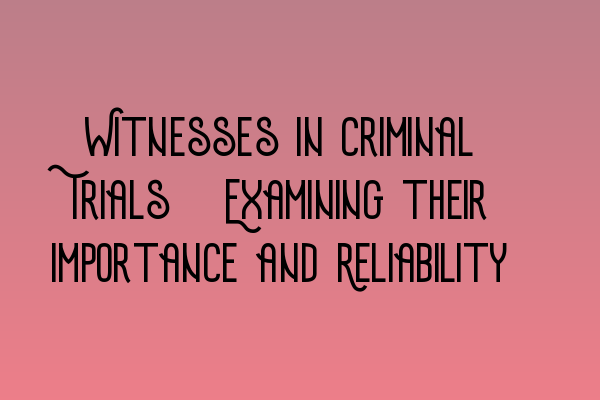Witnesses in Criminal Trials: Examining their Importance and Reliability
In criminal trials, witnesses play a crucial role in providing evidence and helping to establish the truth. Their testimonies can significantly impact the outcome of a case, leading to a conviction or an acquittal. Understanding the importance and reliability of witnesses is essential for both the prosecution and the defense.
Witnesses provide firsthand accounts of events, placing the jury and the judge in the shoes of those who were present at the time of the alleged offense. Their statements can shed light on critical details, establish timelines, and corroborate or contradict other evidence presented in court.
However, it is essential to assess the reliability of witnesses and their testimonies. Factors such as bias, memory errors, and external influences can affect the accuracy of their recollection. It is the duty of the legal professionals to scrutinize witness statements and present any inconsistencies or discrepancies to the court.
During cross-examination, the defense counsel may challenge the credibility of witnesses by highlighting any potential biases or motivations that could influence their testimonies. This process ensures that the jury receives a complete and balanced assessment of the evidence.
To gauge the reliability of witnesses, the following factors should be considered:
- Witness’s demeanor: The witness’s behavior, body language, and overall credibility during their testimony can provide insight into their reliability. A confident and composed witness is more likely to be seen as credible.
- Consistency: Assessing whether the witness’s statements remain consistent throughout the trial is crucial. Contradictory or ever-changing accounts may raise concerns about the witness’s reliability.
- Corroboration: Investigating if witness testimonies align with other evidence can enhance their credibility. Consistent accounts from multiple witnesses or physical evidence that supports their statements strengthen the case.
- Prior convictions or prejudices: The presence of prior criminal convictions or known biases can impact a witness’s credibility. These factors should be explored and presented to the court.
It is also important to acknowledge that witnesses are human and can fall victim to memory lapses or suggestibility. False memories, influenced by leading questions or external influences, can unintentionally taint their testimonies.
Legal professionals must be diligent in ensuring the reliability of witness testimonies. Thorough preparation, strategic questioning, and the presentation of corroborating evidence are essential in assessing the truthfulness of witnesses.
In conclusion, witnesses are vital elements of criminal trials, providing firsthand accounts and perspectives that shape the outcome of a case. Their importance cannot be overstated. However, it is equally crucial to examine their reliability and credibility. By considering various factors, legal professionals can effectively evaluate witness testimonies, ultimately facilitating a fair and just judicial process.
